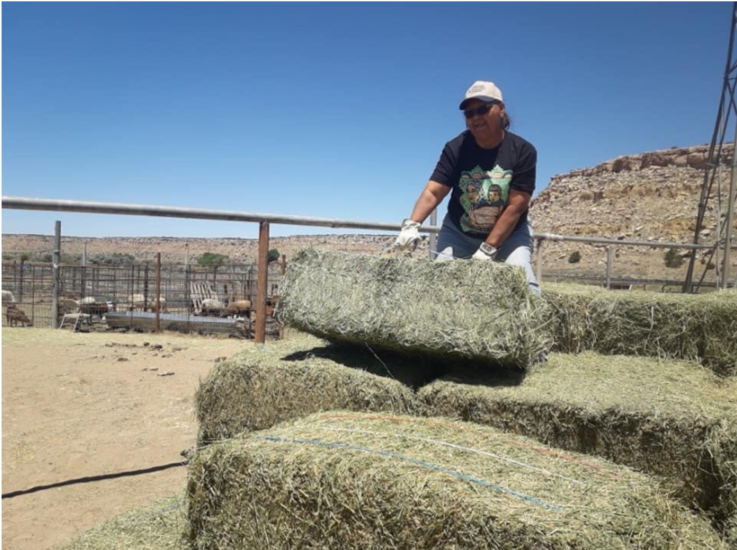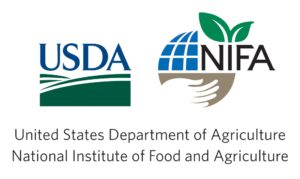Critical hay donation reaches hungry livestock on Hopi Lands
Additional resources are needed to sustain herds through the coming month
Reno, Nev. (July 10, 2020) – A badly-needed load of 350 bales of hay has been purchased and delivered to ranchers and livestock producers of the Hopi Nation in Arizona, through the efforts of the Native Waters on Arid Lands (NWAL) project’s COVID-19 Action Coordination Group.
The hay, which was delivered to the Hopi Veterinary Clinic in Keams Canyon, Ariz. on June 27, provides a crucial source of feed for Hopi cattle, sheep and horses during a time when a 20-year drought has drastically diminished the natural vegetation available for grazing and the normal supply-chain for hay in the region has been disrupted by impacts of the COVID-19 pandemic.
“Before the pandemic, members of the Hopi and Navajo Nations in Arizona would travel off-reservation to buy hay for livestock from farms in the Phoenix valley, then transport the hay back to the reservations to sell along the roadside,” explained NWAL team member Trent Teegerstrom, Director of Tribal Extension for the University of Arizona. “Since their stay-at-home order went into place in March, people from the Hopi Tribe haven’t been able to travel off-reservation, so getting feed for their animals has become a real problem.”
Since mid-March, Teegerstrom and other members of the NWAL team have held weekly video conference calls with Tribal partners from across the Western US to learn about impacts of COVID-19 on Tribal farmers, ranchers and communities, and to identify specific actions for helping.
After learning about the hay shortage from Hopi Tribal Vice Chairman Clark Tenakhongva and Susan Sekaquaptewa (Hopi Tribal Extension/Federally Recognized Tribal Extension Program agent) during an April call, Teegerstrom worked alongside Sekaquaptewa, Jennifer Smith (University of Arizona), Vicki Hebb (NWAL/University of Nevada, Reno) and Robinson Honani (Hopi Department of Natural Resources) to locate funding and organize the logistics for this hay donation. The hay was then purchased from a producer in the Phoenix valley and delivered to the reservation by Dutch Higdon’s Hay Delivery Service.
Above: (On left) 350 bales of hay have been donated to ranchers and livestock producers of the Hopi Tribe, who have been unable to access their normal hay supplies due to stay-at-home orders during the COVID-19 pandemic. (On right) Priscilla Pavatea (in red) and other Hopi Tribal members unload hay at the dropoff point in Keams Canyon. Credit: Robinson Honani, Hopi Department of Natural Resources.
The Hopi Tribe currently has 361 ranchers that hold grazing permits on the reservation, and other independent livestock owners within the villages and communities, according to Priscilla Pavatea, Land Operations Program Manager with the Hopi Tribe’s Office of Range Management. With this hay donation, the Tribe was able to provide two bales of hay to each livestock owner that came to the hay pickup site, free of cost.
“By having the hay available to the livestock owners we were able to keep our ranchers on our reservation and not go off the reservation where they may have contact with the virus.” Pavatea said. “Not all ranchers came to get hay, but the majority that did were very thankful for what they received.”
Due to increases in COVID-19 cases, the Hopi Tribe now has extended their “stay at home” order to July 31, 2020. Although the recent hay donation was very helpful, two bales of hay per rancher will not be enough to sustain the Hopi herds through the next month.
The Hopi Tribe is seeking additional donations for hay purchase and the transportation costs to get it to the reservation. They are also seeking additional funding to support more of this. Anyone who wishes to donate can contact Susan Sekaquaptewa (sks2@email.arizona.edu) or donate through the CALS Tribal Extension Programs website and specify that your gift should be used to purchase hay for the Hopi Tribe (https://give.uafoundation.org/results?id=8282c73c-98bf-4673-a802-151372d91bf1).
###
About Native Waters on Arid Lands
The Native Waters on Arid Lands (NWAL; https://nativewaters-aridlands.com) project seeks to enhance the climate resiliency of agriculture on American Indian lands of the Great Basin and Southwest by building the capacity within tribal communities to develop and implement reservation-wide plans, policies, and practices to support sustainable agriculture and water management. Partners in the project include the Desert Research Institute; the University of Nevada, Reno; the University of Arizona; First Americans Land-Grant Consortium; Utah State University; Ohio University; United States Geological Survey; and the Federally Recognized Tribal Extension Program in Nevada and Arizona. This project is funded by the U.S. Department of Agriculture’s National Institute of Food and Agriculture.
Members of the NWAL team are committed to helping our Tribal partners during and after the COVID-19 pandemic. To learn more about our work on issues related to COVID-19 in Indian Country, please visit: https://arcg.is/15Pma8. Other ongoing COVID-19 relief projects organized by members of this group include a new program to supply free firewood to Hopi and Navajo homes and a water pathogen screening project to look for water quality problems in buildings that have been vacant during the pandemic.
Media Contacts:
Trent Teegerstrom
520-904-5332
University of Arizona Cooperative Extension
tteegers@ag.arizona.edu
Kelsey Fitzgerald
775-741-0496
Native Waters on Arid Lands
Desert Research Institute
kelsey.fitzgerald@dri.edu



 Joe Dirt Excavating
Joe Dirt Excavating Native Waters on Arid Lands
Native Waters on Arid Lands